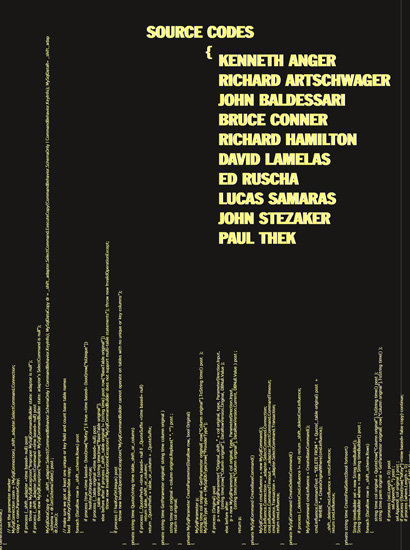Source Codes
dal 25/6/2009 al 28/8/2009
Segnalato da
Kenneth Anger
Richard Artschwager
John Baldessari
Bruce Conner
Richard Hamilton
David Lamelas
Ed Ruscha
Lucas Samaras
John Stezaker
Paul Thek
Johannes Fricke Waldhausen
25/6/2009
Source Codes
Spruth Magers, Berlin
The exhibition is an exploratory approach to the question of where some of the forebears of today's neo-conceptual artists might be located. The project juxtaposes a selection of works by a number of artists and filmmakers from Europe and America who mapped essential conceptual groundwork in the 1960s and 1970s and whose work remains influential to many artists today.

curated by Johannes Fricke Waldthausen
Kenneth Anger, Richard Artschwager, John Baldessari, Bruce Conner, Richard Hamilton, David Lamelas, Ed Ruscha, Lucas Samaras, John Stezaker, Paul Thek
Monika Sprüth and Philomene Magers are delighted to present 'Source Codes', the first group exhibition to be shown in
their new Berlin gallery space since it opened in October 2008. 'Source Codes' juxtaposes a selection of works by a
number of artists and filmmakers from Europe and America who mapped essential conceptual groundwork in the 1960s
and 1970s and whose work remains influential to many artists today.
By examining new ways to rethink and translate visual information and cultural codes in the gaps between Minimalism
and Pop Art, and through an interest in process-based performative practice, their work has exerted significant influence
on younger artists in a variety of ways. Their individual approaches are the result of a critical engagement with prevailing
ideas in conceptual art and have become paradigms for several tendencies in contemporary art. In this sense, the work of
these artists could be seen as precursors, or perhaps as a source, of today's conceptual art practice. In spite of these artists'
impact in the long term, their conceptual practice has resisted topical and up-to-date labelling. They were and are less
determined by predominant trends or transient genre classifications, but rather were driven by personal interests and
necessities, deriving from a critical look at questions and changes of artistic production within their everyday
environment, and tied intrinsically to their historical contexts.
A number of artists in the exhibition reveal the importance of practice that is rooted in the popular culture of the western
tradition, and blurring the borders between 'high and low'. The work of John Baldessari (b.1931) and Ed Ruscha (b.1937)
for instance, conflated visual information and text with a subtle irony towards conceptual intellectualism early on in their
careers. Repositioning painterly abstraction by adopting appropriated imagery from the mass media with linguistic
investigations on canvas, their work lies in the hybrid between painting and photography. By investigating and rethinking
form at the edge of Minimal Art, Richard Artschwager's (b.1923) work provokes stereotypes about perception, the
aesthetic, and material within art and the everyday, whereas the practice of British artist Richard Hamilton (b.1922) draws
connections and distinction between art, product design and popular culture.
The logic of cinema and film has had a seminal impact on artists today, and is another important trope of the exhibition.
Los Angeles based Kenneth Anger (b.1927) is a key figure of American Experimental Avant- Garde Cinema: His films
have had a profound impact on post- war visual popular culture and inspired many filmmakers and artists alike. Anger
forged a hallucinatory, daringly erotic style of non-narrative filmmaking, oscillating between prosaic Hollywood movies,
occult rituals, and the iconography of gay culture. The exhibition features his film 'Invocation of my Demon Brother'
from 1969, a selection of filmstills and a site- specific installation from his book 'Hollywood Babylon' (1959/1975).
Creating surreal, near seamless collages with film stills since the 1970's, London-based John Stezaker (b.1949) addresses
the autonomy of the self-enclosed image. By eclectically combining and appropriating printed matter and cinema
references as disparate source material, Stezaker lifts the image and the sublime on the same level.
Following a process-orientated work approach and translating art into the social and media space, Paul Thek's
(1933-1988) 'Meat pieces' and 'Newspaper paintings' from the 1960s radically rethink Pop Art's subject matter. Like a
personal mythology evolving around the practice of performance, the world of Greek born and New York based Lucas
Samaras (b.1936) focuses on self-depiction and Identity. Working for more than fifty years on a performance-based
life-archive in the sense of an ongoing self portrait, he has substantiated his own image in diverse media, such as
assemblages, sculptures, and photo-collages.
'Source Codes' is not a retrospective or historical exhibition in an ordinary sense. Rather it points towards the present by
focusing on the work of some artists whose earlier viewpoints and "Gesamtkunstwerk" have been inspirations for younger
artists today. It juxtaposes both early and late work by these artists, as it seeks to comprehend the notion of influence
reciprocally, both time- and process-based. The positions joined are less presented as a group because of any shared genre
classification, but rather because their oeuvre is considered to be cohesive over a longer period of time, defying the artistic
mainstream, dominant trends and the prevailing marketing mechanisms of the art system.
Sprüth Magers Berlin will also be concurrently hosting an exhibition with works by Richard Artschwager.
For further information, images and interviews please contact Jan Salewski (js@spruethmagers.com).
Monika Spruth Philomene Magers
Oranienburger Str. 18 - Berlin
Gallery Hours: Tue - Sat, 11am - 6pm
Free admission



